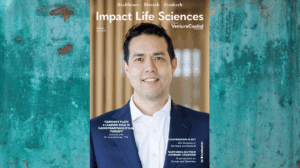'Germany plays a leading role in radiopharmaceutical therapy'
Bildnachweis: ITM Isotope Technologies Munich SE, VC Magazin, Pixabay.
How do you rate Germany as a life sciences location; would you recommend that start-ups set up here?
We are proud to be a German company! We rate Germany very highly – our success as a radiopharmaceutical company has been closely tied to the country since our founding in 2004. From our perspective, there are several reasons why startups, particularly in the radiopharmaceutical therapy (RPT) space, should consider Germany. RPT is an emerging cancer treatment that delivers radiation directly to tumours while minimising exposure to healthy tissue. To fully explore its potential, you need an environment that fosters cutting-edge scientific research and progress. The country has established itself as a global leader in radiopharmaceutical innovation, building on deep expertise in nuclear medicine, outstanding research institutions, and one of the world’s strongest pharmaceutical industries. This robust pharma ecosystem provides vital infrastructure, talent, including continuous output of qualified STEM graduates, and partnerships that start-ups can tap into. There’s also a culture of collaboration between scientists, clinicians, and industry experts, and this can help move breakthroughs from the lab to patients more quickly. For example, our clinical therapeutic candidate, ITM-31, for the treatment of glioblastoma was developed in partnership with researchers at the Helmholtz Institute. Similarly, our long-standing collaboration with the Technical University of Munich (TUM) has been pivotal in advancing cutting-edge research and developing innovative radiopharmaceutical treatments. Germany offers a unique ‘home’ for pharma companies. For ITM, it’s a ‘home’ that supports the development of new radiopharmaceutical therapies and theranostic solutions.
Eckert & Ziegler caused a stir last year with its IPO; ITM with its large financing rounds. How would you categorise German radiopharmaceutical companies in the context of international competition?
The radiopharmaceutical industry is growing rapidly on an international scale, as substantiated by significant financing rounds and acquisitions seen throughout recent years. According to a report by Allied Market Research, the global radiopharmaceuticals market was valued at approximately USD 5.2 billion in 2022 and is projected to surpass USD 13.67 billion by 2032, growing at a compound annual rate of 10.2% from 2023 to 2032. At the same time, there is a rise in the number of radiopharmaceutical candidates progressing through clinical research, particularly for the treatment of cancer indications and stages previously associated with poor prognoses. While research into radiopharmaceutical therapy (RPT) is being conducted worldwide, Germany plays a leading role in this field. The unique landscape here includes pioneering drug developers, radioisotope manufacturers, and research institutes/hospitals with designated radiopharmaceutical departments. Their scientific findings and technical innovations contribute to the innovation in RPT and its potential use while capturing the interest of the biotech sector and investment community. It is an exciting era for the radiopharmaceutical sector, and clinical research driven by biotech, pharma, and academic institutions will play a pivotal role in defining the next phase of this space. The trifecta of German companies, research institutes, and hospitals continue to play an important role in advancing the radiopharmaceutical sector to significantly improve treatment outcomes and quality of life for people living with cancer.

What is special about ITM compared to other companies?
Simply put, we are the only company to integrate both medical radioisotope manufacturing and a large pipeline of novel experimental medicines under one roof. This ‘production-to-patient’ approach delivers clear benefits for our company, our customers, and, most importantly, patients. Our successful isotope business generates revenue that supports and cross-finances the development of our radiopharmaceutical pipeline. Over the last 20 years, we have built strong partnerships with more than 500 researchers, physicians, and hospitals, providing us with access to early data and valuable insights into the latest clinical research. We are the leading global manufacturer of Lutetium-177, the workhorse isotope of RPT that is now used in leading radiopharmaceuticals currently on the market (Pluvicto, Lutathera) and serves as a foundation for numerous drugs in clinical trials worldwide. This dependable, reliable and pure supply of Lutetium-177 ensures that we can both support our customers and meet the demands of our own therapy agents in clinical development. Beyond Lutetium-177, we are expanding our capabilities to encompass the production and supply of additional high-value medical isotopes such as Actinium-225. In parallel with our isotope business, our broad and innovative pipeline reflects the future of the radiopharmaceutical industry and comprises 13 assets across seven tumour types. Our diverse pipeline targets multiple cancer indications by leveraging a range of isotopes in both late-stage and early clinical development. Notably, our lead Lutetium-177-based therapeutic candidate, ITM-11, recently demonstrated positive Phase III data for the
treatment of gastroenteropancreatic neuroendocrine tumours (GEPNETs). ITM-31 is another Lutetium-177-based candidate currently in clinical testing for glioblastoma, a highly aggressive brain tumour. Our earlier assets are starting clinical trials, and this is where we are innovating with new medical isotopes, including Terbium-161 and Actinium-225, new ways to bind to cancers, and new targets on the cancer to which to bind.
What are your current plans following the financing round last summer? Will you remain active in Germany or will you increasingly outsource your production to the USA?
We are currently focused on advancing our lead candidate, ITM-11, toward potential US market approval following its positive Phase III data readout. The phase III Compete study demonstrated that ITM-11 clinically and statistically improved progression-free survival in patients with grade 1 or 2 GEP-NETs, compared to a standard of care treatment. We plan to submit a New Drug Application to the US Food and Drug Administration (FDA) this year and to continue preparing our commercial readiness from our US headquarters in Princeton, New Jersey. While the US is an important market for ITM, we remain a company with strong German roots. Our headquarters, research, and production facilities are largely in Germany, but our operations and network have been global for many years to best meet the growing demand for radioisotopes and radiopharmaceuticals on a large scale. Beyond market preparations for ITM-11, we are dedicated to the expansion of our pipeline and our manufacturing and supply capabilities internationally.
What influence does the current political situation in Germany and the USA have on your growth?
While we are mindful of the broader political environment, the long-term demand for innovative radiopharmaceuticals remains robust. Cancer doesn’t wait for political cycles, and the need for more effective, targeted therapies is only growing. As a global leader in the radiopharmaceutical industry, we are well-positioned to continue expanding, both as a trusted supplier of medical radioisotopes and as a developer of innovative therapies that address critical needs.
A pilot centre will be established in Garching in cooperation with Munich Precision Oncology GmbH (MPO) and the ICPO Foundation. Will this have an impact on ITM’s activities?
ITM is driven by the goal of improving health outcomes for people fighting cancers that remain difficult to treat, and we are driven by others who share our patient-centric approach. We acknowledge the critical role clinicians, researchers, physicists, radiochemists, nurses, and technologists play in the healthcare ecosystem, so it is great to see more initiatives near our headquarters intent on expanding the positive impact that radiopharmaceuticals can have in patient care. ITM is a long-term collaborator with the ICPO, and we look forward to hearing more about how the ICPO and the centre will advance radiopharmaceutical options for people living with cancer.
Where do you see ITM in five years? Are there plans to enter the Asian market?
Cavey: We see an opportunity to cement ITM as a global leader in radiopharmaceuticals over the next five years. Our focus is twofold: strengthening our position as a leading supplier of medical radioisotopes, and advancing a growing pipeline of targeted radiopharmaceutical therapies and diagnostics. With the world’s largest Lu-177 production facility, our Actineer joint venture for Ac-225, and clinical programmes including ITM-11 and ITM-31, among others, we are well-positioned for sustainable growth. We are also expanding internationally, with a Shanghai subsidiary and strategic partnerships in Asia to tap into the region’s rising demand for innovative cancer therapies. However, our ambition extends far beyond any single market, with a steadfast commitment to making a global impact by delivering the next generation of radiopharmaceutical treatments.
VC Magazin: Thank you very much.
About the interview partner:
Dr Andrew Cavey, is a physician and an experienced healthcare executive, with expertise and a successful track record in radiopharmaceutical drug development and commercialisation across leading global biopharmaceutical organisations including Novartis and Bristol Myers Squibb. He joined ITM as Chief Executive Officer on 1 September 2024 to lead the company, already a bedrock of the radiopharmaceutical industry, as it grows and furthers its leadership in radiopharmaceutical therapy innovation.










